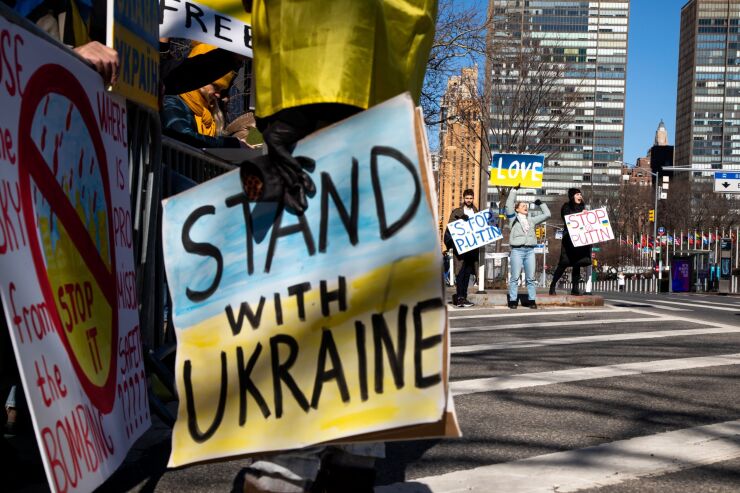Ukrainian-American credit unions — which were founded in the U.S. to provide financial services to immigrants from Ukraine — are spearheading efforts to provide aid to those impacted by Russia’s invasion.
"We can certainly as individual credit unions, and as a national association, directly help monetarily … but in the larger scope of things, we can act as a lever to leverage and provide information to where the greater general American public, and specifically our brothers and sisters in American credit unions, can funnel their donations," said Andrew Horbachevsky, who chairs the Ukrainian American Credit Union Association.
Ukrainian-American credit unions came about after World War II to help refugees who emigrated to the U.S. Today, the UACUA has 12 member organizations which have a combined 100,000 members and roughly $4 billion of assets. Horbachevsky said he and his board are working with member credit unions to help establish donation accounts for both members and nonmembers to contribute support for those in Ukraine affected by the Russian invasion that began Feb. 24.
In addition to providing monetary aid, Horbachevsky stressed that member credit unions are also scrutinizing how best to bolster their cybersecurity against the threat of possible attacks.
“Whenever a credit union has ‘Ukraine’ or ‘Ukrainian’ in their names, they're really in the crosshairs of trolls and Russian hackers, so at this point we're trying to be vigilant and seeing if there is anything besides setting up firewalls and enhancing our penetration testing to ensure that we can continue to operate and help our membership,” Horbachevsky said.

The National Credit Union Administration has circulated alerts from the Department of Homeland Security, the Federal Bureau of Investigation and the National Security Agency warning of cyberattacks. "Given the events over the last few days, attacks on financial institutions are potentially imminent,"
Ukrainian Selfreliance Federal Credit Union, a UACUA member based in Feasterville-Trevose, Pennsylvania, was founded in 1952 to assist Ukrainian nationals who came to the U.S. and were in need of core financial services. Currently, the credit union is working to help funnel donations to assorted charities and facilitate wire transfers to the National Bank of Ukraine for those that wish to support the country’s military, as well as speaking with regulators to ensure UKRFCU has the resources to support heightened cybersecurity.
“Any member of our credit union that wishes to support the Ukrainian military, the National Bank of Ukraine has established a special fund, and to help [incentivize donations] we are providing instructions for how to do so and waiving all wire fees,” said Anatoli Murha, senior vice president of the $416 million-asset credit union.
With many of the credit union’s staff being Ukrainian natives, UKRFCU has been working to ensure its staff are taken care of as well as its members, Murha said.
“When I walked into the office [on Feb. 24], you could hear a pin drop … between myself, our president and our assistant vice president of human relations, we are monitoring the office and making sure that everybody feels that they're getting the support that they need,” Murha said. “I want to make sure that those that have the closest ties to Ukraine have an opportunity to feel that they can express themselves and utilize their freedom of speech and freedom of liberty here in the U.S., which is exactly what they want with their family and friends in Ukraine.”
Global credit union groups like the World Council of Credit Unions, which is headquartered in Madison, Wisconsin, have also launched their own campaigns to help gather financial and humanitarian resources.
Mike Reuter, the executive director of the Worldwide Foundation for Credit Unions, the WOCCU’s official engagement and fundraising arm, worked to quickly establish the
“Historically, our disaster relief work has been very much natural-disaster related in supporting credit union systems with respect to hurricanes and typhoons," Rueter said. "In Ukraine, it’s obviously a different story but the need is still there."
Ukrainian credit unions have already raised and sent over $700,000 through the UACUA, the Credit Union National Association announced last week. With that in mind, Reuter plans to sit down with the UACUA to explore the potential for a collaborative campaign between the two organizations.
When I walked into the office [on Feb. 24], you could hear a pin drop.
As Russia’s push through Ukraine continues to uproot families and disrupt the operations of financial institutions, organizations like WFCU and the UACUA will continue to evaluate where donations can best be served.
“What the fund is meant to do is both serve the short and long term needs of Ukraine's credit union system during the crisis and obviously after … since the crisis is still obviously ongoing, we don't really have a clear sense of what the long term needs are going to be in terms of rebuilding credit union branches themselves or helping the Ukrainian credit union system overall,” Reuter said.
At CUNA's Governmental Affairs Conference last week in Washington, Oksana Markarova, Ukrainian ambassador to the U.S. and former minister of finance for the nation, addressed the crowd of industry experts and credit union executives by Zoom to provide an update on the situation and offer ways to provide support.
“Everyone in Ukraine, our president — who made the extraordinary decision to stay in Kyiv — our government, our armed forces, national guard, police, ordinary people including women and girls … right now we don't have any other choice but to defend our home,” Markarova said. “We don't have another.”





